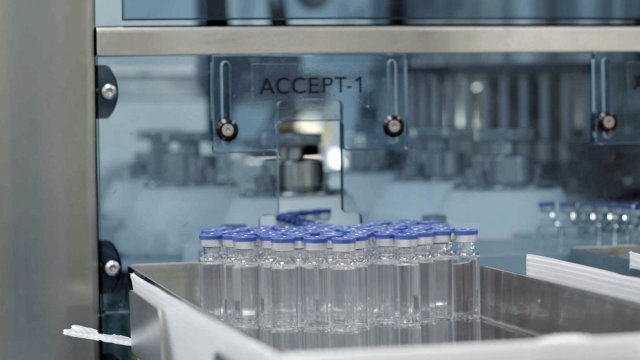Another COVID vaccine is nearing the finish line.
Drugmaker Novavax's vaccine is a two-dose shot, given three to eight weeks apart.
"We do have a problem with vaccine uptake that is very serious in the United States," FDA Center for Biologics Evaluation and Research Director Peter Marks said. "And anything we can do to get people more comfortable to be able to accept these potentially life-saving medical products is something that we feel we are compelled to do."
The science is different from the other COVID vaccine options in the U.S.
Novavax works by using a special targeted protein to supercharge the immune system.
"It's basically a soap bubble," Novavax R&D President Dr. Gregory Glenn said. "It's made of stuff that you find in root beer, but we make it into a little particle about the size of the virus. When an immune cell sees that, it becomes quite activated. And then it's looking for other things that might be associated with being infectious."
The hope is that the Novavax shot will appeal to those who don't want an mRNA vaccine because trials showed it had fewer side effects.
It's also easier to store than Pfizer or Moderna vaccines.
The U.S. is currently averaging 100,000 new COVID cases a day.
It's expected to be an undercount as more people have mild symptoms and federal funding for reimbursement of some tests has dried up.
More cases are expected as the virus continues to evolve, experts say.
Research has shown reinfection is more common with Omicron and its subvariants.
"That happens with all coronaviruses," Johns Hopkins University Center for Health Security Senior Scholar Dr. Amesh Adalja said. "Remember, four other coronaviruses cause about 30% of our common colds and people are reinfected multiple times over their lifetime. That's the path that SARS-COV-2 is taking."
Dr. Anthony Fauci says the pressure is on for new vaccines.
"You want a vaccine that if you administer it in a nasal or oral way, it will give you enough upper airway protection, that not only will you prevent infection, you will prevent transmission. And that's the major full court press that we're putting on now in the scientific community," he said.
According to the CDC, about 80% of Americans have received at least one dose of a COVID vaccine. Just 46% have gotten a booster.
"Children between the ages of 5 and 11 — only about a third of them got vaccinated. I suspect children less than 5, it's going to be even lower than that," Adalja said.
Next week, the FDA and CDC will meet on Moderna's two-dose vaccine for 6- to 17-year-olds and Pfizer's vaccine for kids under 5.
They'll have to weigh the side effects of a vaccine against the overall risk for a severe COVID outcome at that young age group — a risk that remains low.


